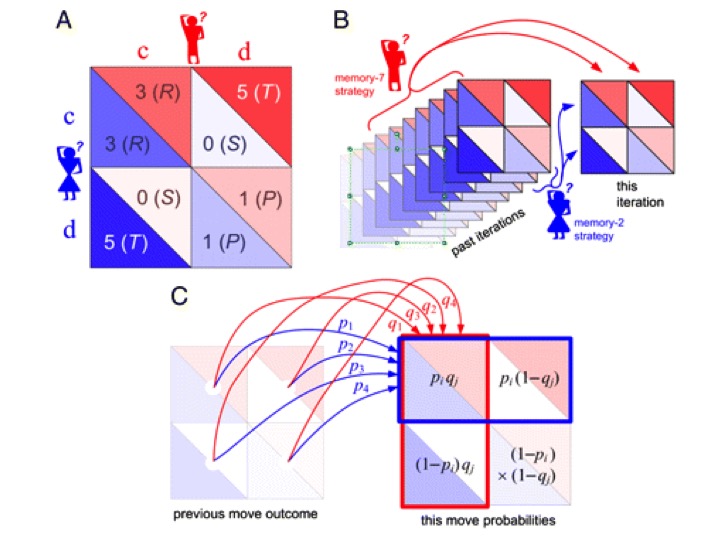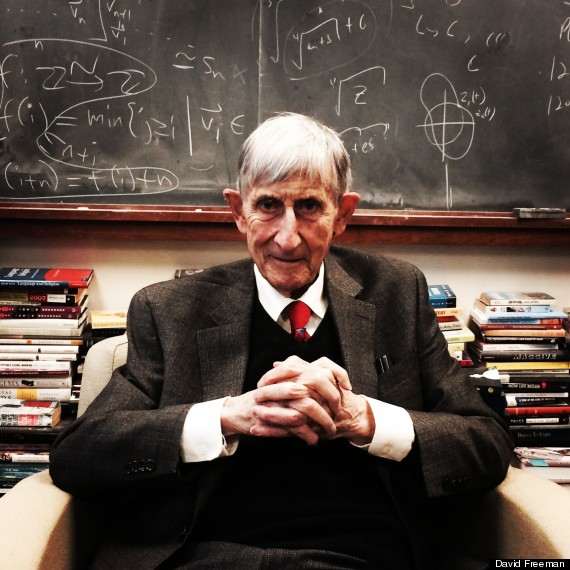.
In Douglas Adams’ The Hitchhiker’s Guide to the Galaxy, at long last we find the smartest guy in the universe. He is a soft-spoken, bizarrely humble man. He lives in a small shack, is kind to everyone, and is far less sure of himself than is every person dumber than him. Which is, of course, everybody.
As it turns out, the Earth is in fact in exactly that situation.
Freeman J. Dyson is an “infinitely smart,” kindly old man who has lived in the same house for 50 years, with the same woman. He is a Christian but he votes very liberal, so there’s something in him for everybody.
;- )
Dyson for 40 years was the lead physics professor at Princeton’s Institute for Advanced Study, a postgrad think tank that transcends the Ph.D. system. Quite literally, the Feynmans and von Neumanns of the world come to sit in his physics classes. This despite the fact that Dyson does not himself have a Ph.D. :- ) and in fact recommends against the entire grad-school system. IAS transcends doctors, and Dyson transcends the IAS. I got yer 9-sigma brain right here, pal.
.....
This blurb from noconsensus.org will give you a feel for it… http://www.noconsensus.org/scientists/freeman-dyson.php
In a recent 8,000-word profile, the Times says Dyson is "a scientist whose intelligence is revered by other scientists." One colleague describes him as "infinitely smart." Another says: "You point Freeman at a problem and he’ll solve it. He’s extraordinarily powerful.”
Dyson is also a longstanding member of JASON - "a small government-financed group of the country’s finest scientists" that evaluates matters of an often classified nature. At JASON meetings, in which everyone present is considered brilliant, reports the Times, someone will idly pose a math question and Dyson will quickly provide an answer, pointing out that "the smallest such number is 18 digits long."
In the words of one of Dyson's colleagues, "When this happened one day at lunch, the table fell silent; nobody had the slightest idea how Freeman could have known such a fact or...could have derived it in his head in about two seconds.”
.
Another Enrico Fermi moment :- ) came when William H. Press e-mailed a little "puzzle," the Iterative Prisoner's Dilemma, to Dyson. The world's scholars had posted 1000's of articles and concluded there was no solution, but -- according to Press -- Dyson "thought about it for 60 seconds" and deduced the dominating solution. It did, however, take Freeman a half-hour to actually write up the study. This was in 2012, when Dyson was 88 years old. LOL.
.
.
Fermi moments aside, there are three basic reasons we wanted to call your attention to Dyson. In order of importance:
(1) Guys like MisterJonez and Mo’ Dawg and Mojo enjoy playing in such amazing intellectual sandboxes.
(2) Dyson’s Zen-like observations on Global Warming are interesting.
(3) It’s one more chance for Dr. D to plug away at his favorite hobby horse, the idea that if you're smart you pretty much got the world figured out.
.
WOBAL GLARMING
At BJOL this week, there is yet another hot firefight on Wobal Glarming. On one side is Bill James, and on the other side is everybody else. James argues for calm discussion, and the other side argues No, you really should make Flat Earthers shut up, because they impede progress. Here’s an example:
.
Hey Bill, hasn't the global warming debate at least moved onto whether humans are contributing? Rather than, it's a natural cycle of the planet? Some in the fringe are still arguing that the climate is actually not changing. But really, isn't the "debate" now about whether fossil fuels should continue to be subsidized? (Or, Obama should be opposed, regardless of science?)
Asked by: paulw112
Answered: 10/27/2015
I don't think there is A debate about Global Warming. I think we're dealing with 8 or 10 separate debates.
The discussion I am trying to foster here has to do with "How do you get people to accept scientific research?" Do you do that by insulting those who disagree with you, with sarcasm, rudeness, arrogance. Apparently, based on my e-mails, quite a large number of people feel that that's the way to go. My position is that the argument will go much better for you if you use patience, humility, discipline and understanding. Back to the 8 or 10 separate debates. . ..
Many of those who are in the "anti" camp here perceive those who are in the "pro" camp as making a four-stage argument, Stage One, The Planet is Warming Up; Stage Two, This will have terrible consequences; Stage Three, we must act now, as a nation, to avoid these turable consequences, Stage Four, We must concentrate power in Washington sufficient to avoid these terrible consequences. The people who are "resisting" Stage One, in my view, mostly are resisting Stage One not because they care about Stage One, but because they are violently opposed to Stage Four, and they are resisting Stage One out of the fear that it will lead to Stage Four.
If we could agree that Stage One doesn't inevitably lead to Stage Four, then, in my view, most people would be happy to agree to the Stage One proposition.
.
Dyson, in this Salon interview http://www.salon.com/2007/09/29/freeman_dyson/ makes 3 Zen-like points that I personally had never seen emphasized during these Wobal Glarming debates:
(1) On the whole, it is a GOOD thing for the Earth to be warmer.
(2) Even if it isn’t, the Earth is warming very slowly and our tech is advancing very rapidly.
(3) Ergo, there’s nothing much to worry about. In 50 years, the planet will be only a bit warmer, and we’ll easily have solved the problem. "We'll have an ample supply of fuel without having to dig it out of the ground," he insists. "Fifty years is long enough for that kind of technology to take over the world, and 50 years is short enough so that the climate won't have changed very much in the meantime."
If we could put away politics for 2 seconds ....
.
.
.
.
.
just for 2 seconds ...
.
.
.
.
.
This sentiment is very comforting, is it not?
.
.
That might be right, or not. Dr. D has no big axe to grind either way on this issue. If you want to debate it in the thread, ‘ave at thee.
.
LINKAGE ... er, READAGE
Back to our primary mission here? Let’s link you up to several nourishing Freeman web pages. Obviously, he could be wrong about things. But he's obviously worth listening to.
.
.
INTERVIEW ON CULTURAL EVOLUTION. Dyson asserts that “Darwinian evolution” ended when technology transcended it, and that the time is coming when no species other than human beings will exist. He has written several books on the subject. An excerpt from the interview:
The Darwinian interlude has lasted for two or three billion years. It probably slowed down the pace of evolution considerably. The basic biochemical machinery o life had evolved rapidly during the few hundreds of millions of years of the pre-Darwinian era, and changed very little in the next two billion years of microbial evolution. Darwinian evolution is slow because individual species, once established evolve very little. With rare exceptions, Darwinian evolution requires established species to become extinct so that new species can replace them.
Now, after three billion years, the Darwinian interlude is over. It was an interlude between two periods of horizontal gene transfer. The epoch of Darwinian evolution based on competition between species ended about ten thousand years ago, when a single species, Homo sapiens, began to dominate and reorganize the biosphere. Since that time, cultural evolution has replaced biological evolution as the main driving force of change. Cultural evolution is not Darwinian. Cultures spread by horizontal transfer of ideas more than by genetic inheritance. Cultural evolution is running a thousand times faster than Darwinian evolution, taking us into a new era of cultural interdependence which we call globalization. And now, as Homo sapiens domesticates the new biotechnology, we are reviving the ancient pre-Darwinian practice of horizontal gene transfer, moving genes easily from microbes to plants and animals, blurring the boundaries between species. We are moving rapidly into the post-Darwinian era, when species other than our own will no longer exist, and the rules of Open Source sharing will be extended from the exchange of software to the exchange of genes. Then the evolution of life will once again be communal, as it was in the good old days before separate species and intellectual property were invented.
.
WIKIPEDIA PAGE. For once, Wiki gives you a charming, concise, and fairly unbiased read on a scientist it doesn’t like. Why would you "link" Wikipedia, which is so easy to find? Just to call your attention to the fact that this is an unusually good Wiki page.
.
ESSAY BY DYSON on the need for open-mindedness in science. You wonder whether he and Rupert Sheldrake have ever been seen in the same room together. :- )
.
INTERVIEW WITH KRISTA TIPPETT. Dyson comments on Einstein’s God and the nature of mystery in the created universe.
.
DYSON VS DAWKINS. An amusing 1-page exchange in which Dyson (a physicist) destroys Dawkins (a biologist) in an exchange on, um, biology. http://edge.org/discourse/dawkins_dyson.htm
.
DYSON ACCEPTING THE 2000 TEMPLETON AWARD. To Dr. D, this is the most fascinating of all his interviews - the broadest in scope as well as the most concise.
Dyson's thoughts are an endless source of Parisian nooks and crannies that lead everywhere and nowhere. Enjoy the reads.
Cheers,
Jeff


